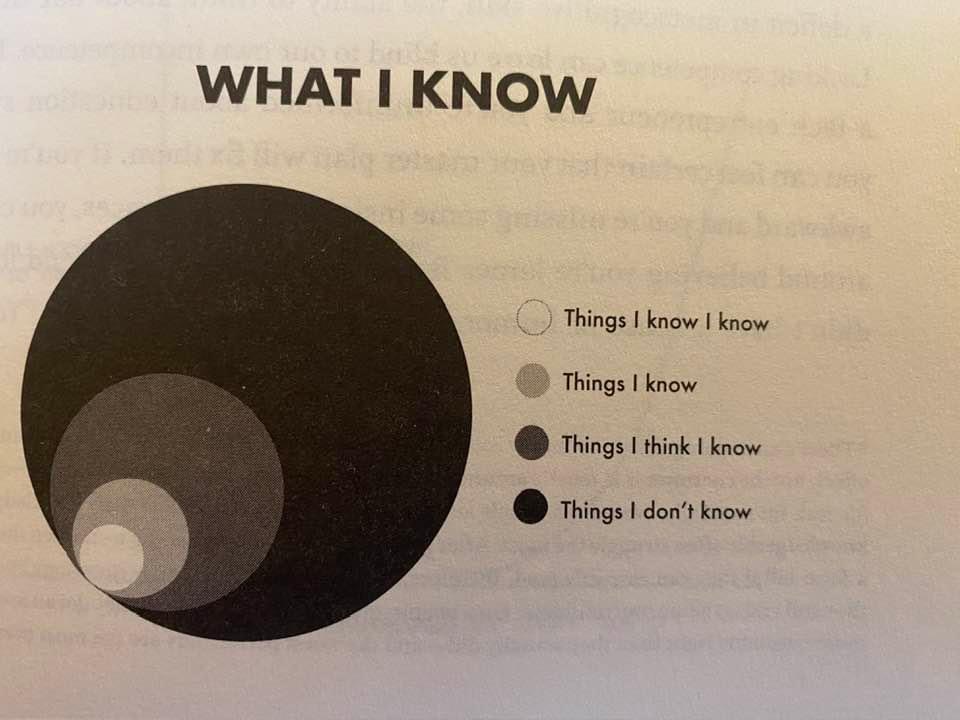Reading Adam Grant’s 2021 book, “Think Again.”.
The book is an “invitation to let go of knowledge and opinions that are no longer serving you well, and to anchor your sense of self in flexibility instead of consistency. If you can master the art of rethinking, you’ll be better positioned for success at work and happiness in life. Thinking again can help you generate new solutions to old problems and revisit old solutions to new problems. It’s a path to learning more from the people around you and living with fewer regrets. A hallmark of wisdom is knowing when it’s time to abandon some of your most treasured tools – and some of the most cherished parties of your identity.”
Many years ago, long before I became theologically enraptured by The Beatitudes, I had seen a poster that said, “Blessed are the flexible for they shall not be bent out of shape.” It impressed me as having a lot of truth-value.
I learned many lessons through the years about flexibility AND consistency, and about when, where, and how to use each……. usually by failing to exercise one or the other or to shift in a timely manner by rethinking the situation. The closer I’ve leaned into Jesus and grown to desiring to walk in Christ, the easier that has gotten.
The thing that finally helped me seal the deal on which one to give greater weight was a a prayer workshop at our church a few years ago led by Rev. Mark Nysewander.
He said that God’s will is less like a blueprint, hard and fast, to be meticulously adhered to for perfect performance and is more like a river into which we are invited to leap and then go where it carries us! That latter image resonated with me, especially based on my 25+ year history at the time of pursuing knowledge of and obedience to God’s will.
So, as I dive into this book, I’ll be interested to see how Grant sorts through the differences between when to use which in terms of thinking again that will be reflected in the examples he uses.
That distinction between the two finally sealed the deal for me that, in many things of a “non -essential” nature in my system of values and beliefs, as suggested by John Wesley, should be dealt with in a charitable, i.e. flexible and merciful, manner. Those things that are deemed “essential” or “non-negotiable” in my values and beliefs need to be firmly known, understood, defensible, and steadfastly in keeping with my commitment to biblical authority and Holy Spirit illumination.
In reading “Think Again”, this little chart is rather informative. One may have heard someone say, “We don’t know what we don’t know.”. Take for instance, the Dunning -Kruger Effect….It is when we lack competence that we’re likely to be beaming with overconfidence. In the original studies people who scored the lowest on logical reasoning, grammar, and sense of humor had the most inflated opinions of their skills. On average they believed themselves to perform better than 62% of their peers when ,in reality they outperformed only 12% of them. The less intelligent one is in a particular domain the more he seems to overestimate his actual intelligence in that domain…. It is important because it compromises self-awareness and trips people up in many settings. Desire to learn from others, vulnerability in admitting one’s weaknesses, and openness to correction improves one’s ability to function with greater humility in reality and avoid the overconfidence trap that is a bubble of beginner’s flawed assumptions, ignorant of one’s own ignorance. The antidote to getting stuck camping out atop Mt. Stupid is humility, a crucial nutrient of the mind.
Blogger Tim Urban observes, “While humility is a permeable filter that absorbs life experience and converts it into knowledge and wisdom, arrogance is a rubber shield that life experiences simply bounce off of.”
Observed….. again and again. “The smart learn from their mistakes. The wise learn from the mistakes of others.” And I would add, the truly wise seek, listen to, and follow the guidance of God, in whom all wisdom originates.

![MPj04389070000[1]_phixr](http://disciplerofself.com/wp-content/uploads/2015/03/MPj043890700001_phixr.png)